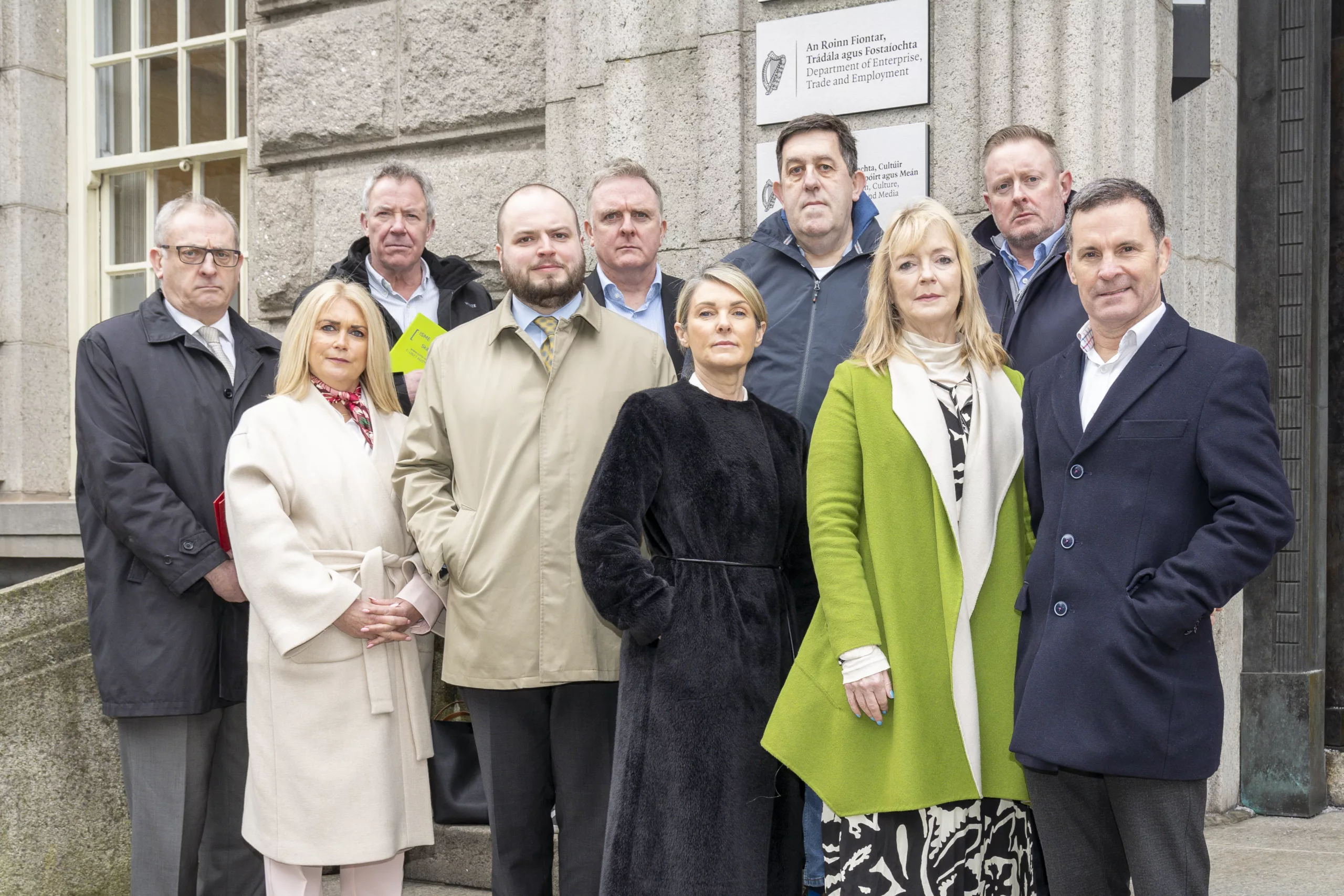Spearheads nationwide campaign on Labour Costs

Launching the SME campaign were – back row (from left): Adam Weatherley, ISME Skillnet; Sean Collender, Restaurants Association of Ireland; Stuart McNamara, Irish Craft and Artisan Distilleries Association; Damien Heffernan ISME. Front row (from left) Neil McDonnell, CEO, ISME; Elaine Dunne, Federation of Early Childhood Providers; Aidan Finnegan, Family Business Network; Suzanne Bannon, John Bannon Pharma; Tara Buckley, RGDATA; and Marc O’Dwyer, Chair of ISME. Photo by Siobhan Taylor.
12th March 2024: In response to ongoing significant concerns at the treatment of the SME sector by policy makers in Ireland, ISME and a number of other trade organisations have today launched a major nationwide campaign focused on the cumulative increases in labour costs and representation on the Labour Employer Economic Forum and the Low Pay Commission. As part of the campaign, they are calling for a permanent nine per cent Vat rate for the food service, entertainment, experiential and grooming sectors.
The pledge for the campaign National Minimum Wage reform; Tax reform; and Industrial Relations reform. The campaign slogan is “Save Jobs – Sign the Pledge” where ISME and its affiliated organisations will seek wider support for its objectives.
ISME has a total membership of 10,500 across Ireland, which is a combination of both individual SME’s and a number of leading affiliated trade organisations.
National Minimum Wage
The manner in which the National Minimum Wage (NMW)/Living Wage is being calculated ignores the fact that workers in large firms are paid €287.67 per week (38%) more than workers in SMEs; and public servants are paid €351.92 per week (46%) more. This is based on figured from the fourth quarter of 2023. Small business cannot afford to be benchmarked against such high wages.
“It is ridiculous to benchmark SME pay against public sector pay in Ireland. Average Public Sector pay significantly exceeds that in the private sector – even in multinational companies,” said Neil McDonnell, CEO, ISME. “The gap between public and private sector pay in Ireland is bigger in Ireland than in any EU countries other than Portugal, Spain and Italy, where private sector pay is far lower.”
Use of public sector and multinational pay rates are therefore an unfair benchmark against which to set pay in small businesses. It is important to state that future NMW increases must not exceed the Consumer Price Index. Also, The 8.8% rate of PRSI must apply to the entirety of the NMW.
Labour Employer Economic Forum (LEEF)
It is beyond comprehension how SMEs do not have pro-rata representation on the Labour Employer Economic Forum and the Low Pay Commission. Small and medium businesses make up 99.8% of total businesses, and employ 60% of workers in Ireland, yet the stakeholders on LEEF are the big employers and unions. The owners and employees in Ireland’s SME sector are being continuously snubbed by Government on LEEF.
Neil McDonnell said: “The Taoiseach and government has ignored the SME sector repeatedly in our request for representation on LEEF. This is not an acceptable situation, and it is far from equitable. In reality SME employers must be represented pro-rata on LEEF. That is sixty per cent. This is a major issue for us, which we will continue to pursue.”
Vat rate at 9%
The food service and grooming sectors require the permanent establishment of a 9% VAT rate. This is backed by contemporary evidence, where recently there has been a spate of closures, particularly in the food service entertainment and experiential sectors.
There is no “right level” of Vat. Even at 9%, Ireland’s reduced Vat rate will remain in the top third of EU Vat rates. Our top rate of 23% is also seventh highest in the EU and should revert to its long-established historic rate of 21%.
It is proven that higher Vat rates do not increase the exchequer tax yield. They discourage spending and reduce yield. That is why high taxes are imposed on cigarettes.
Wider government support for SMEs
Small businesses in Ireland employ 1.3 million people, but the promised Government support for small business of €257m, is less than one tenth of what it will spend on the 10.25% pay increase for the 385,000 people employed in the public service.
This is evidence, once again, that the Government and policy makers are taking the SME sector for granted. At some point it will be required to properly recognise in policy terms the role of SME and the deficits in supports that needs to be addressed.
Campaign
A campaign has been established, which has a working website, savejobs.ie and ISME members and a range of other trade and employee representatives will be joining in. In an election year, national and local politicians can be expected to hear from SMEs in the coming months, particularly as we head towards the European and local elections.
Among those organisations who have initially signed up to the Savejobs.ie campaign with ISME are the Irish Hairdressers Federation; Restaurants Association of Ireland; Irish Hardware Association; Nursing Homes Ireland; Retail Excellence Ireland; Hair and Beauty Industry Confederation; Vintners’ Federation of Ireland; and Convenience Stores & Newsagents Association.
(Ends)


